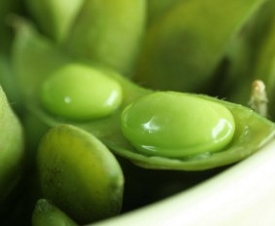The active ingredient LIMITS the effectiveness of the treatment to tackle the disease
 It is considered a healthy alternative to dairy milk – and is famously popular among the yummy mummy crowd.
It is considered a healthy alternative to dairy milk – and is famously popular among the yummy mummy crowd.
But experts warn that women shouldn’t start consuming soya milk after a breast cancer diagnosis – because it may limit the effectiveness of treatment.
Tamoxifen could be inhibited due to soya’s active compound, genistein, interfering with the medicine’s action, a study found.
Paradoxically, the naturally-occurring ingredient remains safe for women if it formed part of their diet before diagnosis, scientists claim.
Professor Leena Hilakivi-Clarke, of Georgetown Lombardi Comprehensive Cancer Centre, who conducted the biological pathway on rats, explained that timing of genistein intake is crucial.
‘Oestrogen drives most breast cancer growth, yet high soya intake among women in Asian countries has been linked to a breast cancer rate that is five times lower than Western women, who eat much less soya,’ she said.
 The study, which was published in the journal Clinical Cancer Research, could help patients improve the role that diet plays on their treatment.
The study, which was published in the journal Clinical Cancer Research, could help patients improve the role that diet plays on their treatment.
Lead researcher Dr Xiyuan Zhang added that longtime sustained use of genistein before a diagnosis has a similar action to Tamoxifen.
‘It inhibits a mechanism called autophagy that would allow cancer cells to survive, which explains why it helps tamoxifen works,’ she said.
However, starting to consume it after breast cancer develops not trigger anti-tumour immune response to eliminate cancer cells when tested on rats.
Those consuming genistein as adults had a 7 per cent chance of breast cancer recurrence after tamoxifen treatment, compared with a 33 per cent recurrence with rats exposed to genistein only after breast cancer developed.
Dr Zhang added: ‘We do not know yet why this made the animals resistant to the beneficial effects of tamoxifen and increased risk of cancer recurrence.’
Researched and written by James Draper for and published by The Daily Mail ~ February 1, 2017.
 FAIR USE NOTICE: This site contains copyrighted material the use of which has not always been specifically authorized by the copyright owner. We are making such material available in our efforts to advance understanding of environmental, political, human rights, economic, democracy, scientific, and social justice issues, etc. We believe this constitutes a ‘fair use’ of any such copyrighted material as provided for in section 107 of the US Copyright Law. In accordance with Title 17 U. S. C. Section 107, the material on this site is distributed without profit to those who have expressed a prior interest in receiving the included information for research and educational purposes. For more information go to: http://www.law.cornell.edu/uscode/17/107.shtml“
FAIR USE NOTICE: This site contains copyrighted material the use of which has not always been specifically authorized by the copyright owner. We are making such material available in our efforts to advance understanding of environmental, political, human rights, economic, democracy, scientific, and social justice issues, etc. We believe this constitutes a ‘fair use’ of any such copyrighted material as provided for in section 107 of the US Copyright Law. In accordance with Title 17 U. S. C. Section 107, the material on this site is distributed without profit to those who have expressed a prior interest in receiving the included information for research and educational purposes. For more information go to: http://www.law.cornell.edu/uscode/17/107.shtml“
